'Hey hey, ho ho, the occupation has got to go!' Chants ring out from crowd during UC Berkeley commencement
Marisa Gerber
Sat, May 11, 2024
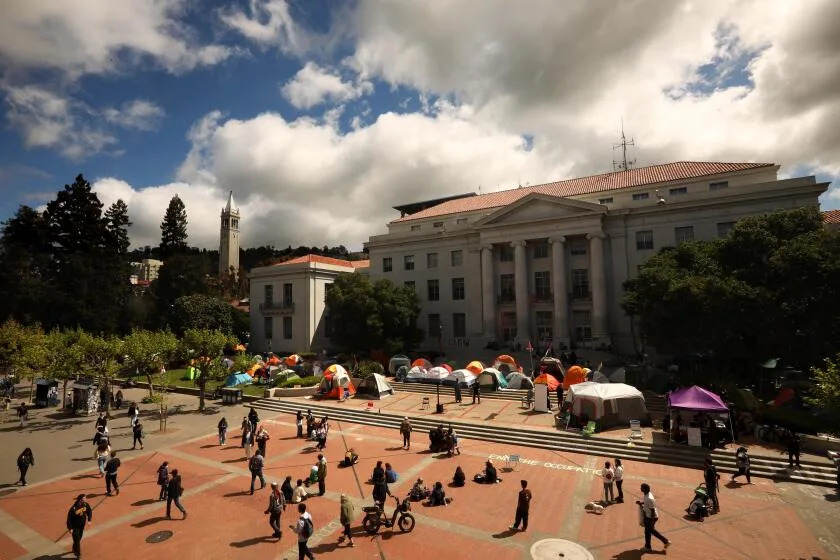
A tent encampment last month in front of UC Berkeley's Sproul Hall protested the Israel-Hamas war. (Genaro Molina / Los Angeles Times)
UC Berkeley Chancellor Carol Christ opened her comments at the university’s commencement ceremony Saturday by addressing recent student protests on the campus with a long and deeply influential legacy of student activism.
“I’m saddened by how this conflict has divided students, faculty and staff,” Christ said. “While most of our campus community has engaged peacefully, political positions have bled over too easily and quickly to antisemitism and anti-Palestinian harassment.”
“We have lost the ability to talk with one another,” she added. “It is my hope that we can soon find a way to recognize our shared humanity.”
Whistles and applause rang out from the crowd gathered at the California Memorial Stadium. Eventually, as some people began to chant and shout, Christ continued her remarks over all the noise. A few minutes later, Sunny Lee, the university’s dean of students, asked the crowd to quiet down.
“If you continue to disrupt the event,” Lee said, “we will have you leave.”
A livestream of the event showed several law enforcement officers walking briskly behind the podium. A few minutes later, as louder chants began to ring out from the crowd — including a chorus of “Hey hey, ho ho, the occupation has got to go!" — Lee again asked for quiet.
Moments later, the livestream of the event cut out for several minutes and instead music, including Journey’s “Don’t Stop Believin'," played in the background.
Since the beginning of the Israel-Hamas war, universities across the state and nation have grappled with how to respond to both protests on campus and students' commentary about the war at off-campus sites and online.
In April, a dinner for graduating UC Berkeley law students at a dean's home devolved into a tense confrontation and accusations of anti-Muslim and anti-Jewish hatred — a scene that captured national headlines after video spread of the dean shouting at a student, “Please leave. No. Please leave."
Later in the month, Dan Mogulof, an assistant vice chancellor at the university, put out a statement saying UC Berkeley would "take the steps necessary to ensure the protest does not disrupt the university’s operations."
At USC, President Carol Folt's decision to rescind the valedictorian's speaking slot after undisclosed threats sent the campus into two solid weeks of protest and controversy. Many classes moved online and the university canceled its main stage ceremony, instead offering an alternative celebration at Los Angeles Memorial Coliseum.
On Friday, Asna Tabassum, the Muslim valedictorian whose speech was canceled amid controversy over her pro-Palestinian views, received her diploma during the Viterbi School of Engineering graduation ceremony. Wearing a sash bearing her academic achievements, including her minor in resistance to genocide, Tabassum beamed, and her entire class and some spectators stood to applaud her.
Earlier this month, amid questions about why UCLA was so poorly prepared to stop a recent attack on a pro-Palestinian camp formed at the heart of campus, the university announced it had launched an internal probe and implemented new security procedures.
And Pomona College — where, last month, police in riot gear arrested several people who occupied the college president's office — announced recently that it was moving its Sunday commencement ceremony off-site to the Shrine Auditorium in Los Angeles.
Read more: 55 years after Reagan took on Berkeley, Newsom stays in the background amid roiling campus protests
But Berkeley has a uniquely long and influential role in the history of campus protests.
In the winter of 1964, students protesting free speech restrictions occupied the campus' Sproul Hall and, at one point, thousands of students surrounded the police car in which a student leader had been detained.
Protests went on for months, garnering national headlines, and eventually many of the restrictions were lifted — a step that paved the way for later movements in opposition of the Vietnam War and in support of environmentalism and women's rights. A decade ago, the campus that once tried to censor many of the student leaders invited them back to campus, lauding them as heroes.
In May 1969, on the sixth day of demonstrations over plans to develop land known as People’s Park, then-Gov. Ronald Reagan called in more than 2,000 National Guard troops and hundreds of highway patrolmen, who descended on campus with weapons. A helicopter hovered overhead, spraying protesters with tear gas.
More than half a century later, Gov. Gavin Newsom has taken a decidedly different approach, keeping largely in the background as universities across the state struggle with how to respond to current protests.
During Berkeley's graduation Saturday, momentum grew among a group of protesters who gathered in part of the stadium. Dressed in caps and gowns, some carried Palestinian flags and others waved black-and-white keffiyehs in the air. In video clips posted on X by the San Francisco Chronicle, protesters chanted "End, end the occupation!" and "Free Palestine!"
Mogulof, the assistant vice chancellor, noted in an email that the protesters eventually "left voluntarily and the ceremony proceeded and was completed as planned without further disruption."
Earlier in the ceremony, Sydney Roberts, the student body president, addressed the crowd, saying that, like many others gathered, she had chosen the university for its academic excellence but also to be part of a place that strives to make a difference in the world.
As Roberts spoke, a few shouts rang from the crowd and eventually Lee, the dean of students, walked to the lectern and interrupted.
“Many see your pain. We hear you,” Lee told the chanting members of the crowd before, again, asking them to quiet down out of respect for the student body president. Roberts returned to the microphone.
"This wouldn't be Berkeley without a protest," she said.
Small pro-Palestinian protests held Saturday as college commencements are held
SUSAN HAIGH
Updated Sat, May 11, 2024
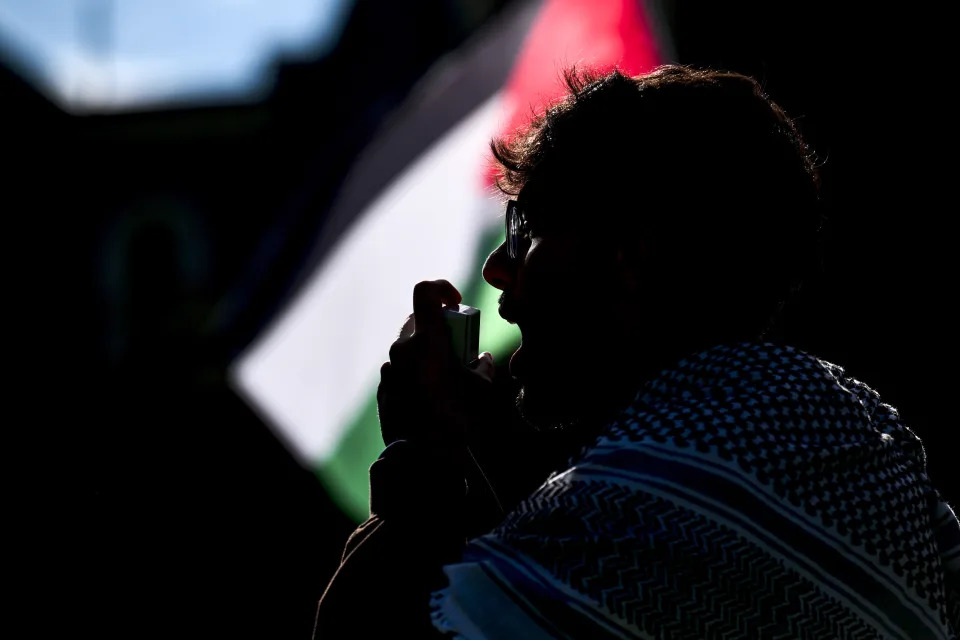
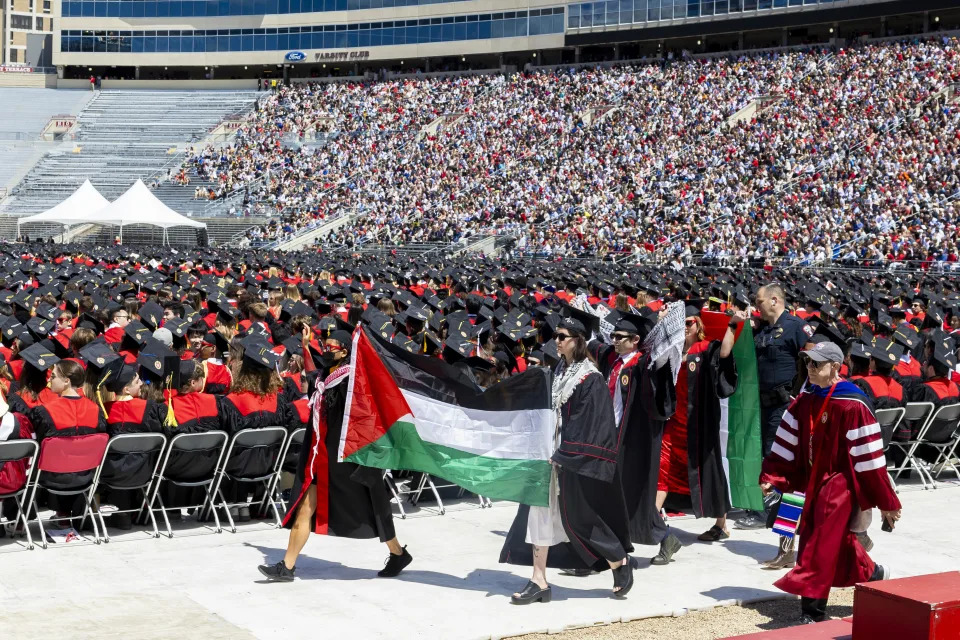
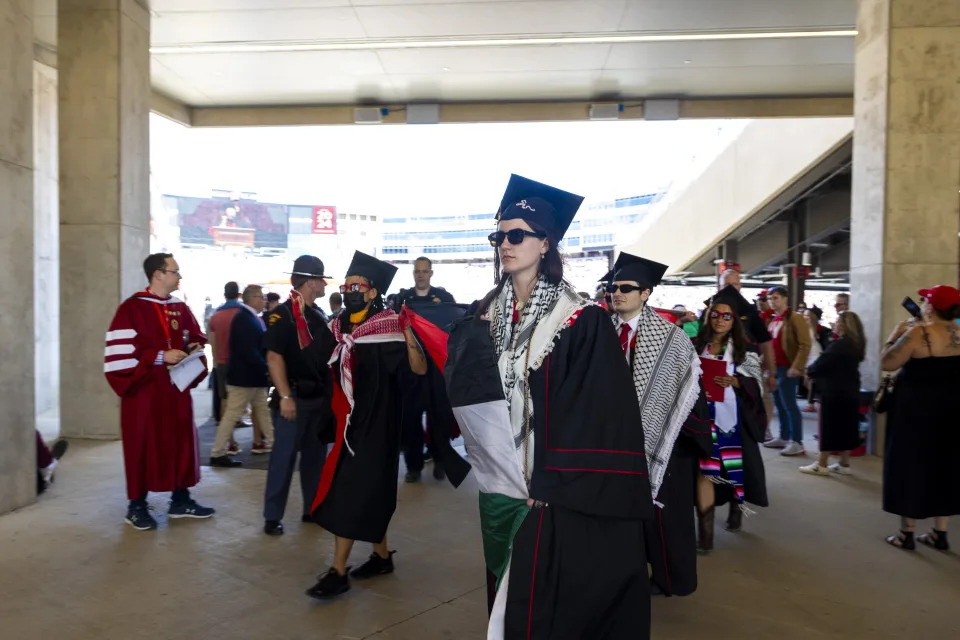
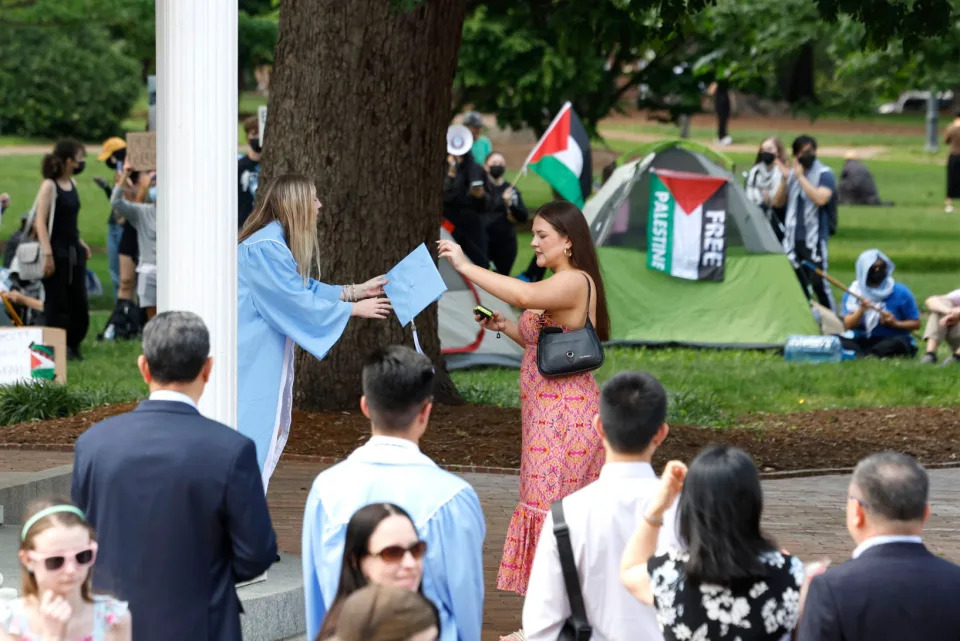
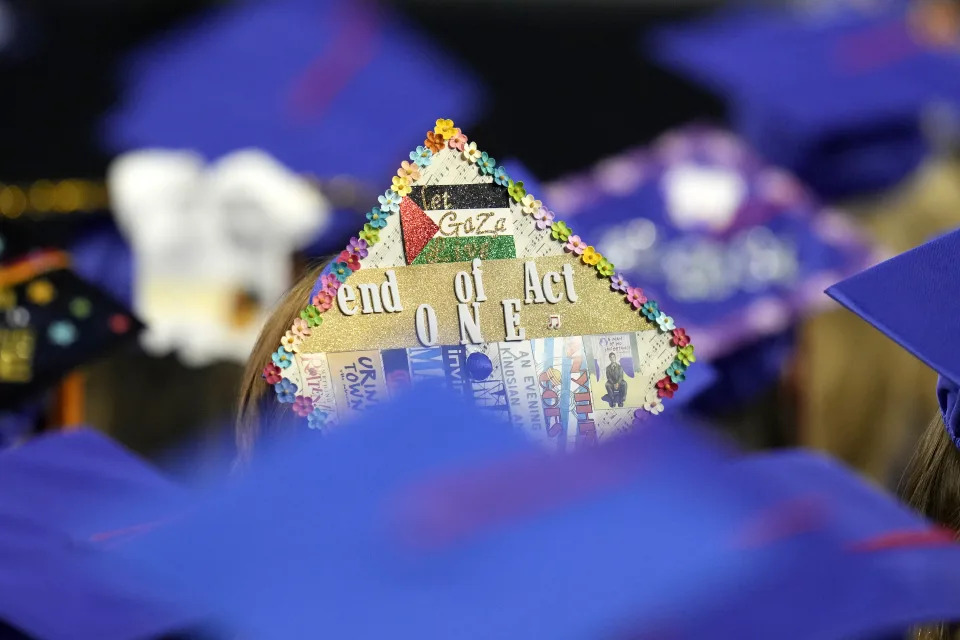
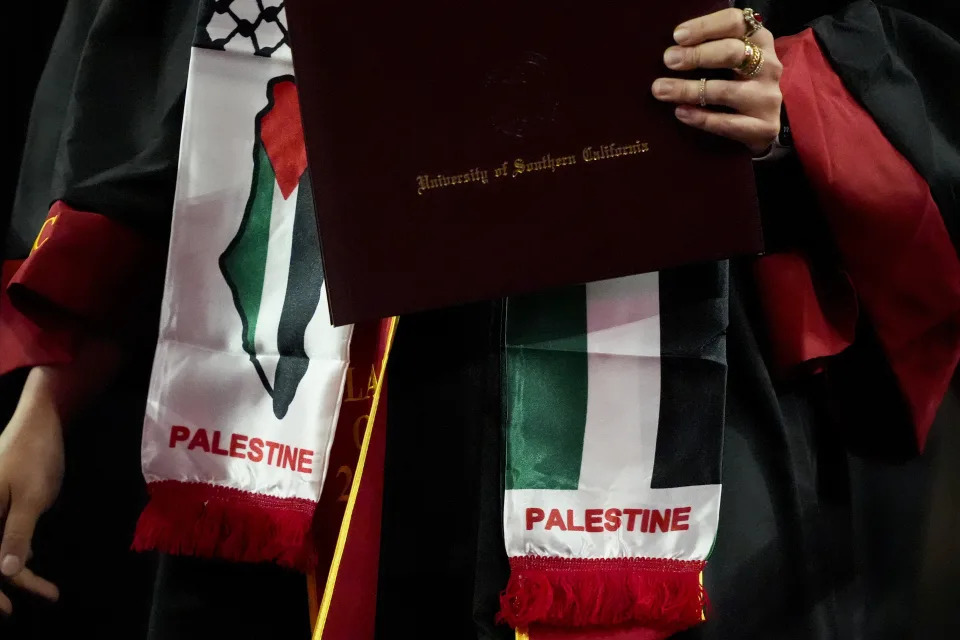
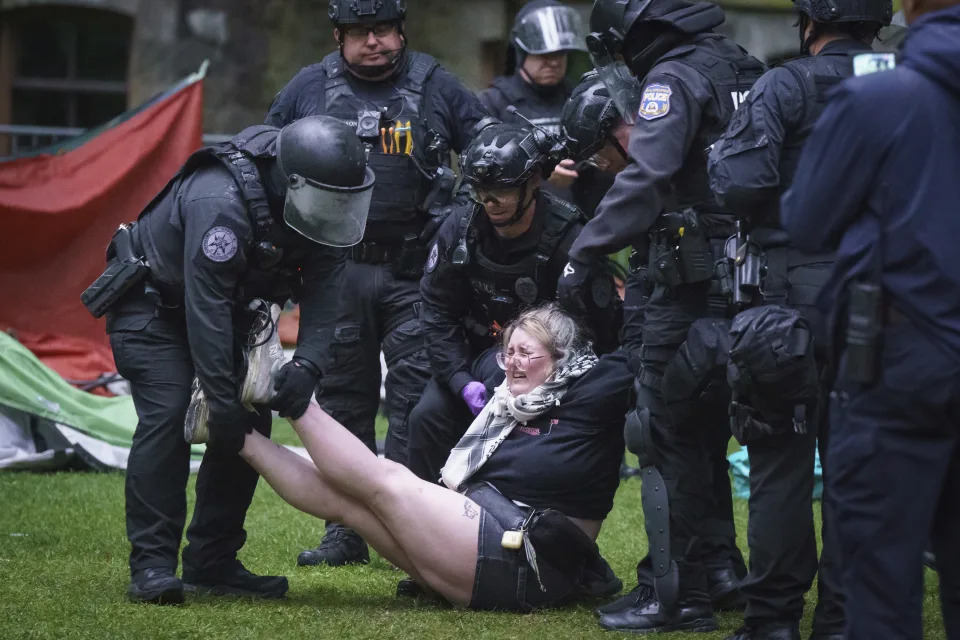
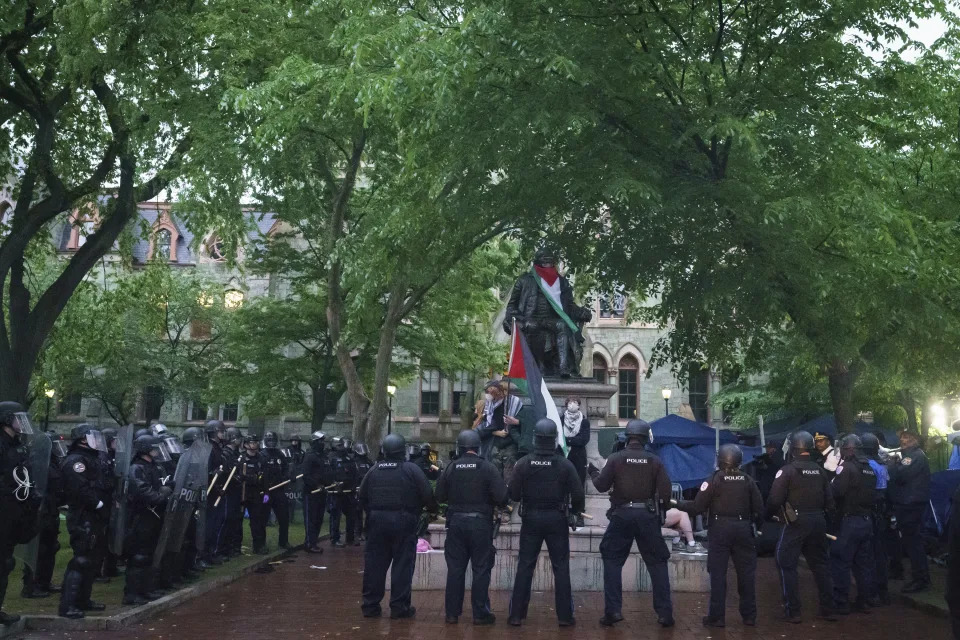
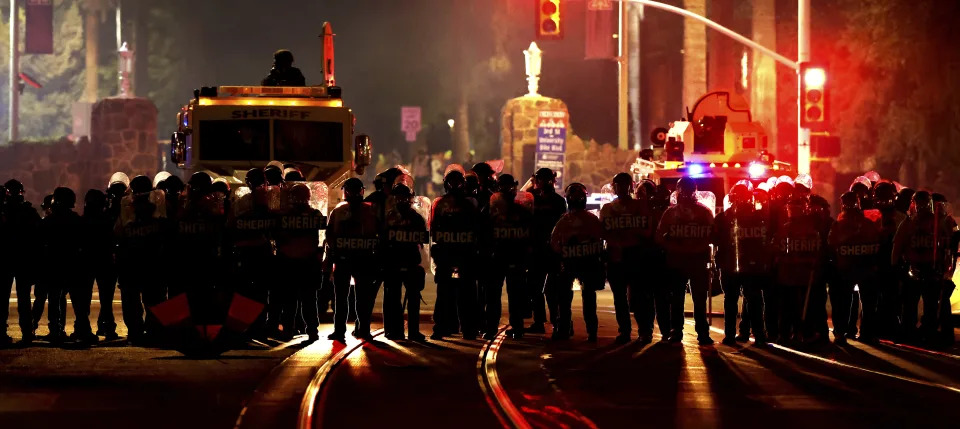
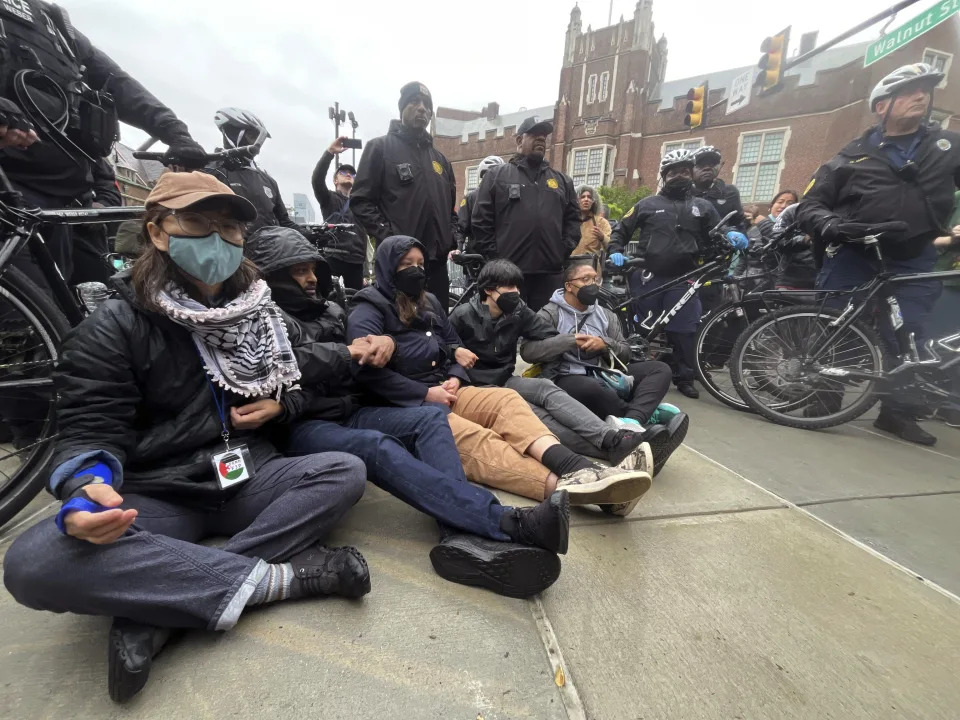
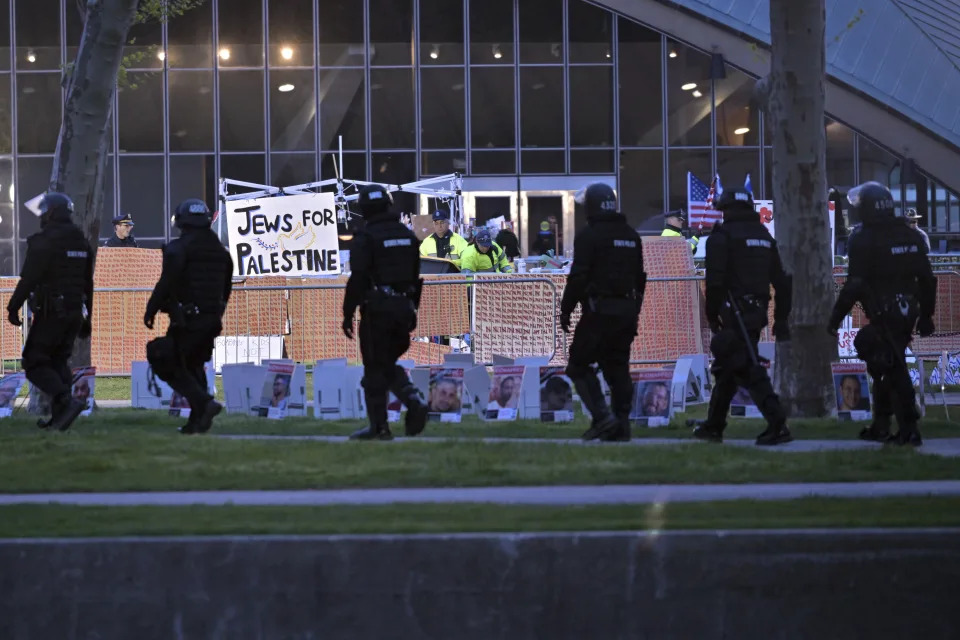
Israel Palestinians Campus Protests
A line of police in riot gear walk past police dismantling pro-Palestinian encampment at MIT, before dawn Friday, May 10, 2024, in Cambridge, Mass. (AP Photo/Josh Reynolds)
ASSOCIATED PRESS
Small pro-Palestinian protests popped up sporadically Saturday as colleges and universities from North Carolina to California held commencement ceremonies, including dozens of graduating students at Virginia Commonwealth University who walked out on an address by Gov. Glenn Youngkin.
While some of the estimated 100 students and family members who left during the Republican governor's speech showed support for Palestinians, others held signs signaling opposition to Youngkin's policies on education, according to WRIC-TV.
At the University of Wisconsin-Madison, a small group of demonstrators staged what appeared to be a silent protest during commencement at Camp Randall Stadium. A photo posted by the Wisconsin State Journal showed about six people walking through the rear of the stadium, with two carrying a Palestinian flag.
Marc Lovicott, a spokesperson for campus police, said the group, which he believed were students because they were wearing caps and gowns, “was kind of guided out but they left on their own.” No arrests were made.
The demonstration came after pro-Palestinian protesters at the campus agreed Friday to permanently dismantle their two-week-old encampment and not disrupt graduation ceremonies in return for the opportunity to connect with “decision-makers” who control university investments by July 1. The university agreed to increase support for scholars and students affected by wars in Gaza and Ukraine.
At the University of North Carolina, Chapel Hill, pro-Palestinian demonstrators splattered red paint on the steps of a building hours ahead of the school’s commencement ceremony and chanted on campus while students wearing light blue graduation gowns posed for photos, the News & Observer reported. At the University of Texas, Austin, a student held up a Palestinian flag during a commencement ceremony and refused to leave the stage briefly before being escorted away by security.
And at the University of California, Berkeley, a small group of pro-Palestinian demonstrators began waving flags and chanting during commencement and were escorted to the back of the stadium, where they were joined by others, according to the San Francisco Chronicle. There were no major counterprotests, but some attendees voiced frustration.
“I feel like they’re ruining it for those of us who paid for tickets and came to show our pride for our graduates,” said Annie Ramos, whose daughter is a student. “There’s a time and a place, and this is not it.”
Saturday's events were less dramatic than what happened on other campuses Friday, when police made dozens of arrests as pro-Palestinian protest encampments were dismantled at the University of Pennsylvania and the Massachusetts Institute of Technology. Those actions came hours after police tear-gassed demonstrators and took down a similar camp at the University of Arizona.
The Associated Press has recorded at least 75 instances since April 18 in which arrests were made at U.S. campus protests. Nearly 2,900 people have been arrested at 57 colleges and universities. The figures are based on AP reporting and statements from schools and law enforcement agencies.
At Virginia Commonwealth University, Youngkin, who also received an honorary doctorate of humane letters at Saturday's commencement, did not appear to address the students who left the event.
“The world needs your music,” Youngkin said during his speech. “You, all of you, will be the symphony. Make it a masterpiece.”
___
Associated Press writers Rick Callahan in Indianapolis and Kimberlee Kruesi in Nashville, Tennessee, contributed to this report.
VCU students walk out of commencement protesting Youngkin speech
Lauren Irwin
Sat, May 11, 2024
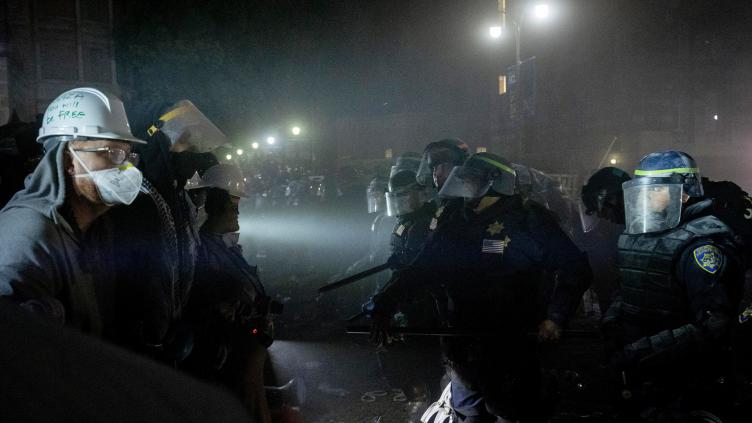
Students at the Virginia Commonwealth University (VCU) walked out of their commencement ceremony to protest an address by Gov. Glenn Youngkin (R-Va.).
About 100 of the 1,200 graduates at the graduation ceremony Saturday quietly filed out of the Greater Richmond Convention Center, some wearing kaffiyeh scarves and signs reading “Teach Black history” and “Book bans [do not equal] respect for learning,” The Washington Post reported.
Youngkin, who won election in 2021, continued on with his speech. The Hill has reached out to Youngkin’s office for comment.
The Post reported that the Richmond university has a long history of having the sitting governor give a commencement address.
Earlier this week, the Virginia NAACP VCU chapter sent a letter to the Board of Visitors and the university president demanding that Youngkin’s invitation to speak be rescinded.
“Your administrative decision to continuously postpone the racial literacy requirement as well as comply with Governor Youngkin’s demand to view the syllabi is anti-democratic and anti-intellectual,” the organization said in the letter, reported by 13 News Now. “These actions not only undermine academic freedom from intellectual inquiry, they also perpetuate a narrative that overlooks the intricate nuances of racial history.”
The university handed out cards to attendees congratulating the graduates but also said if anyone disrupts the ceremony, they would be subject to removal, the Post reported.
The walk out follows many other demonstrations at university commencement ceremonies and the nationwide pro-Palestinian protests happening on college campuses. More than 2,000 people have been arrested at demonstrations across the country.
Police used pepper spray to disperse a crowd at VCU’s on-campus demonstration and 13 people, including six students, were arrested, according to the Post.
Students spoke to WWBT 12 On Your Side, saying there’s “a lot of distress” about Youngkin being chosen to speak.
They were opposed to multiple of Youngkin’s principles, including the LGBTQ+ community and critical race theory.
Youngkin criticized the college protests for crossing the line when “you begin to build encampments which are not allowed on college campuses, you intimidate other students, you’re trying to disrupt the operations of the school, that will not be allowed.”
Last week, students interrupted the graduation ceremony at the University of Michigan, protesting the school’s investments to companies with ties to Israel.
Graduation Can’t Stop These Students From Protesting
Amanda Yen
Sat, May 11, 2024
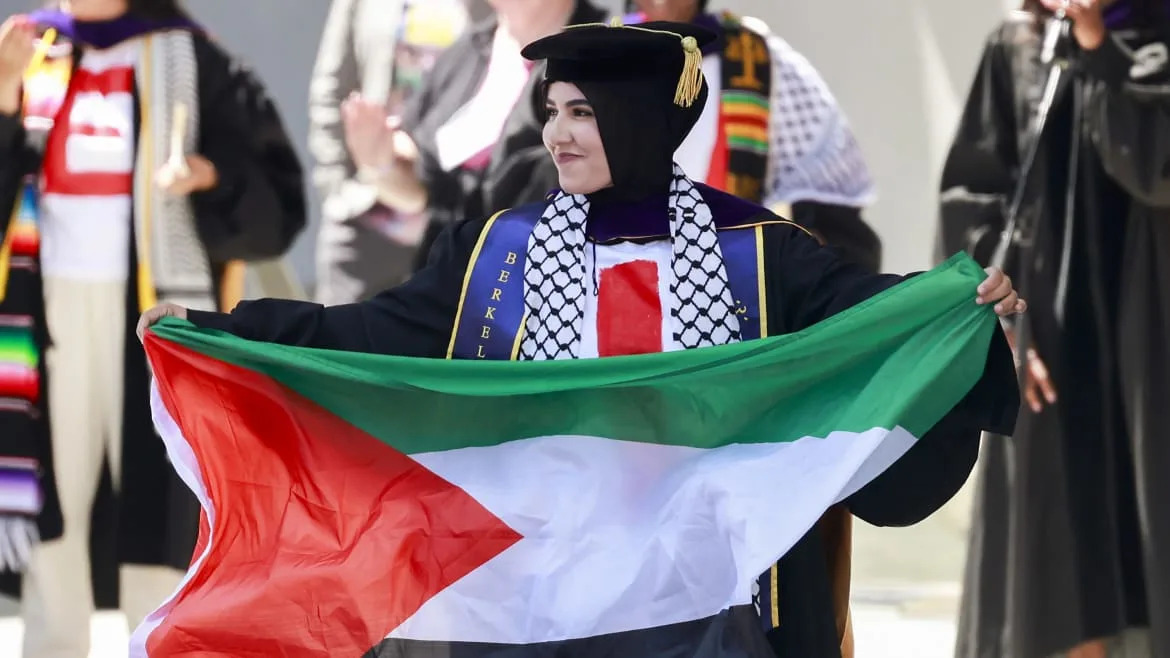
Jessica Christian/Getty Images
Classes may be over but student protests showed no signs of stopping this weekend as hundreds of graduates from California to Virginia continued to demonstrate against Israel’s war in Gaza, as it appears poised to enter its most deadly stage.
Demonstrations were peaceful and minimally disruptive, a stark contrast to the violent arrests of students that university leaders had sometimes facilitated in previous weeks. Police intervention was nearly non-existent on Friday and Saturday’s demonstrations.
On Saturday, pro-Palestine protesters at the University of Wisconsin-Madison booed Chancellor Jennifer Mnookin during her speech at the commencement ceremony in the school’s football stadium. Rachel Hale, a UW student journalist and graduating senior, shared a photo from the ground that appeared to show a group of students holding up a Palestinian flag in protest.
The Wisconsin demonstration took observers by surprise, as the university had reached a deal with protesters the day before to avoid disruptions at “this weekend’s graduation ceremonies or other campus functions,” according to a university message. Now that the terms of the agreement appear to have been violated, the protesters may face disciplinary action. Kelly Tyrrell, a spokeswoman for the university, said the ceremony was “not interrupted” by the small protest.
“As we indicated, we will be addressing any potential conduct violations,” Tyrrell told The Daily Beast.
Meanwhile, at the historically protest-heavy University of California in Berkeley, protesters enacted a wave of demonstrations at the university-wide commencement Saturday morning. As Chancellor Carol Christ welcomed graduates and guests, a few students stood up, waved Palestinian flags, and started singing, “Hey hey, ho ho, the occupation has got to go,” the Bay Area Mercury News reported.
Officials paused the speeches to warn protesters they’d be kicked out if they didn’t quiet down, and Christ was able to finish her speech. But the demonstrations continued as hundreds of students marched over to a section of the bleachers near the stage, stomping as they cheered, “Free, free Palestine.”
Dan Mogulof, UC Berkeley’s Assistant Vice Chancellor for Communications, said the protesters left voluntary and no one was arrested.
“UC Berkeley strives to celebrate the achievements of our graduates in a safe and respectful environment,” Mogulof said in a statement to The Daily Beast. “While today’s commencement was, at times, unfortunately disrupted, it did not prevent us from honoring the hard work and accomplishments of our students.”
Across the country, graduates of Virginia Commonwealth University walked out of their commencement ceremony during a speech by Republican Gov. Glenn Youngkin, both in support of Palestine and to protest the governor’s anti-LGBTQ+ and anti-Black history policies. Some of the protesters wore keffiyehs, and others held signs that read “Teach Black History” and “Book Bans ≠ Respect For Learning,” The Washington Post reported.
This weekend’s protests continued a nationwide trend of student demonstrations at graduation, which began last week at the University of Michigan and a few other schools.
On Saturday, as commencement protests continued, Israel ordered new evacuations as it pressed its offensive into the border city of Rafah, where more than 1.4 million Palestinians are sheltering with virtually nowhere left to go. The Israeli military has characterized the attack as a targeted operation to take out Hamas militants. The United Nations has warned the offensive would cripple humanitarian efforts in a region where famine is imminent and hospitals run on reserve fuel.
The U.N.’s food agency said it was projected to run out of food for southern Gaza by Saturday afternoon, a U.N. agency official told the Associated Press.
Read more at The Daily Beast.
Pro-Palestine student protests continue at weekend commencement ceremonies
Lauren Irwin
Sat, May 11, 2024
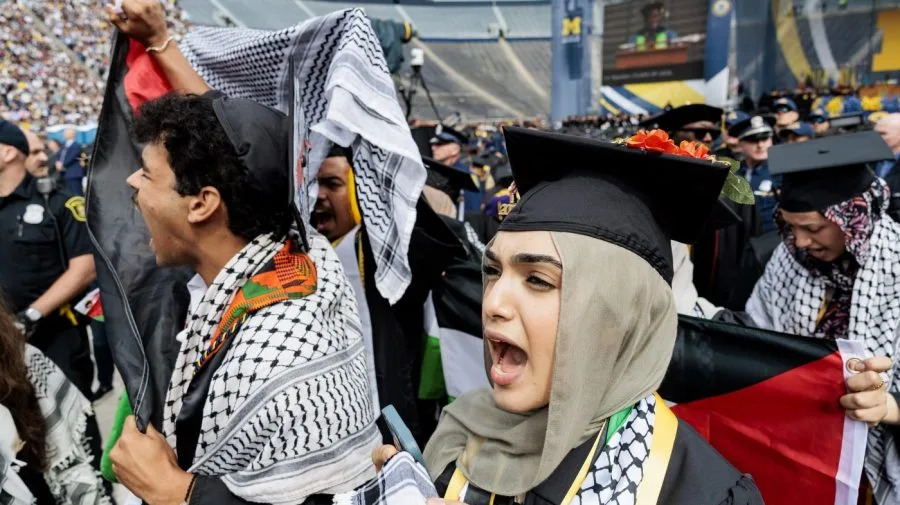
Pro-Palestine protests have continued at multiple universities this weekend, with students attempting to send a message during their commencement ceremonies.
Student at University of North Carolina Chapel Hill protested outside campus buildings, splattering red paint on the steps of one, the News and Observer reported.
“Today is UNC’s graduation commencement and students have established an encampment at the famous bell tower, where many graduates will want to take their graduation photos,” National Students for Justice in Palestine posted online.
At the end of the chancellor’s commencement address, students moved up the center aisle carrying two Palestinian flags. They were met with boos and people chanting “USA!” The people were ushered away by police, the outlet reported.
Students demonstrating at the North Carolina university clashed last week, when counter protesters held up an American flag on campus while activists threw items at them after attempting to replace it with a Palestinian flag.
The scene resonated with people across the country, and a GoFundMe was set up to throw the fraternity men “a Rager.” It raised over $500,000.
In Wisconsin, a handful of students quietly protested the war. Roughly 20 students stood and turned their backs during University of Wisconsin-Madison Chancellor Jennifer Mnookin gave her address, Wisconsin Public Radio reported.
Other students wore messages including “There are no universities in Gaza” and “Free Palestine.” A group of students carrying a Palestinian flag were escorted by police out of the arena.
In Virginia, about 100 graduates at Virginia Commonwealth University walked out of their ceremony to protest an address given by Gov. Glenn Youngkin. They were protesting the ongoing war and Youngkin’s ideologies.
The commencement protests follow weeks of demonstrations at more than 400 universities across the country. From the Ivy Leagues to small colleges, students are demanding that their school’s divest from Israeli companies or companies that have ties with Israel.
More than 2,000 arrests have been made, as universities grapple with how to balance free speech and disruptions on campus.
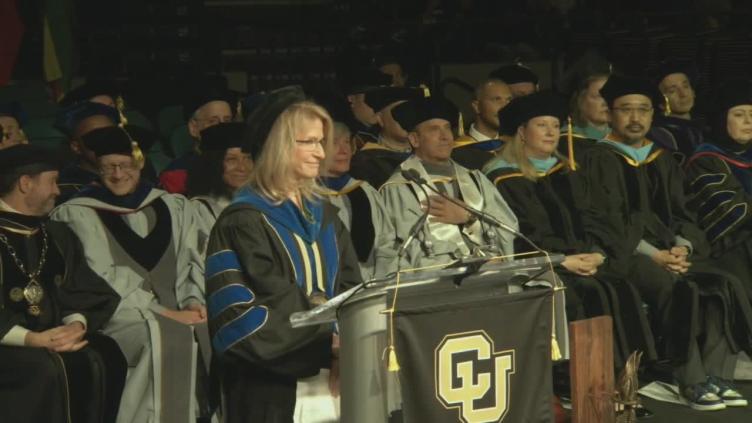
Pro-Palestinian protesters disrupted graduation ceremonies during the 2024 University of Colorado Denver Commencement Program Saturday.
Gen Z students lead pro-Palestine demonstrations while their Boomer professors see parallels to past protest eras
Hannah Getahun
Sat, May 11, 2024
Students and their professors are asking universities to divest from Israel.
At Indiana University, protesters say they've been met with a militarized response from police.
Professors say the current protests share stark differences and chilling similarities to past ones.
On April 25, a day after Indiana University made a controversial change to its protest policies, students built an encampment on the school's Dunn Meadow.
The meadow had been designated a free speech lawn since 1969, when the school experienced increased student protests over tuition hikes, anti-Black racism, and the Vietnam War.
Multiple generations of activists are now gathered on that same ground to protest Israel's war on Gaza — though the police presence was much different than what protesters before had known or experienced, per people who spoke to Business Insider.
The decision made on April 24 required that the "temporary or permanent installation of structures in Dunn Meadow (including, but not limited to posters, tents, etc.) at any time must be approved in advance by the university and, if approved, adhere to the guidelines provided by the university," according to a statement from Indiana University President Pamela Whitten.
The university enforced its policy against the encampments by calling police to arrest demonstrators who did not comply with the rule against "unapproved temporary or permanent structures," it said in a press release.
A statement from Whitten shared with Business Insider said the policy change was made to "balance free speech and safety in the context of similar protests occurring nationally."
The change resulted in what Barbara Dennis, a 64-year-old professor at Indiana University's School of Education and self-described "longtime peace activist," called a "militarized" police response.
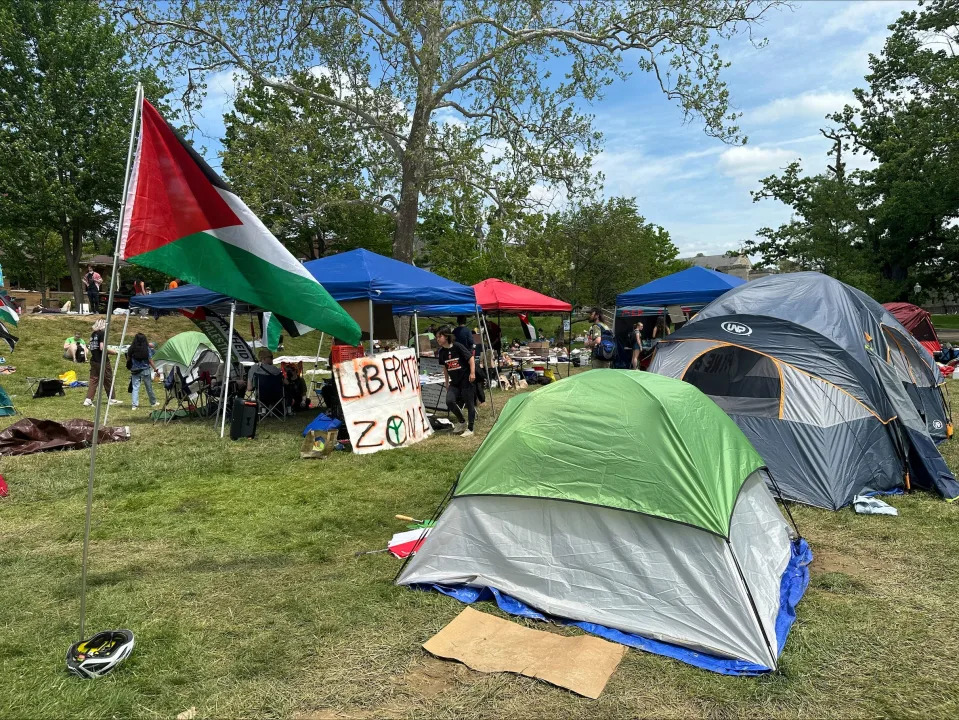
A Palestinian flag waves over the Indiana University Liberated Zone.Isabella Volmert/AP Photo
She joined the campus protests on April 25 alongside her husband, an IU staff member. Within hours, Dennis was detained — and is now appealing a one-year ban from entering the university campus.
Dennis said the response was unlike anything she had witnessed on campus since she began teaching there in 2001 and went against everything she knew beforehand about the university's history.
From Vietnam to the Israel-Hamas War
When Dunn Meadow was established in 1969, official university policy dictated that overnight encampments were not allowed. Despite this, Dennis said the policy had never been enforced until now.
She said that during the Vietnam War era, South African Apartheid in the 1980s, and the first Gulf War, protest tents were left up in the meadow, sometimes for months.
Dennis described similar scenes while on campus witnessing the Iraq War protests and the Occupy Wall Street movement. She said a kitchen was erected during protests, and people slept there overnight.
"It's not just that the militarization is new," Dennis told BI, "IU had previously allowed people to camp in the meadow in peaceful protests without invoking its own policy on overnight tents."
IU did not respond to questions about enforcing its overnight tent policy in the past and pointed Business Insider to public statements from Whitten.
'We know this kind of thing has happened on college campuses'
Videos and images from college campuses across the nation over the past weeks show a mass police presence and dozens or hundreds of demonstrators being detained. In the US, over 2,000 demonstrators have been arrested so far, The New York Times reported.
At Columbia and City College of New York, 300 protesters were arrested in one night on April 30.
As students face university and police responses to their protests, school faculty and staff are also taking a stand and, in some cases, protecting students by getting in front of the police or forming human chains.
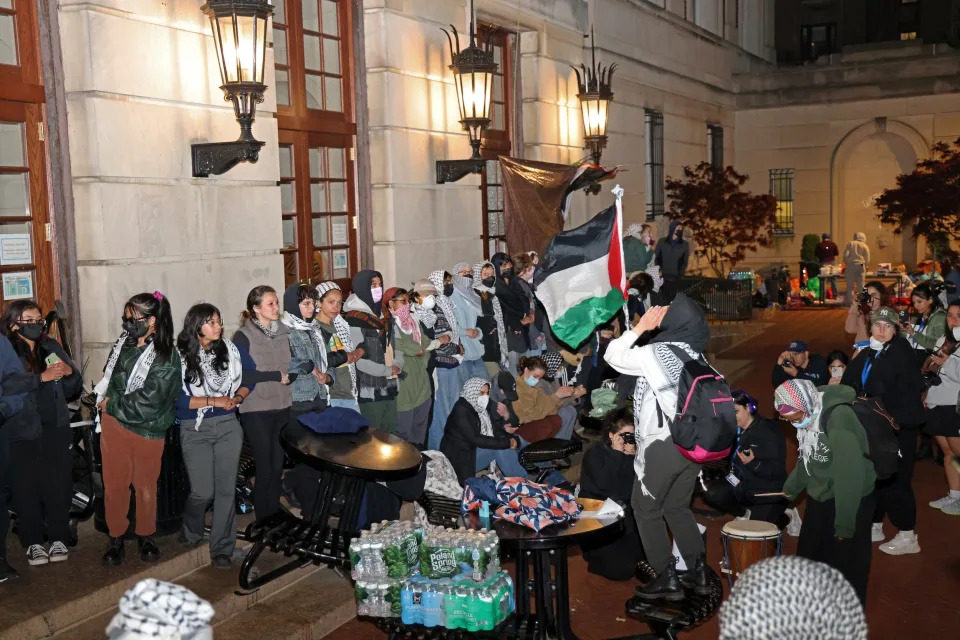
Pro-Palestinian protesters lock arms at the entrance to Hamilton Hall on the campus of Columbia University in New York City.Jia Wu/AFP via Getty Images
Dennis said that when she was arrested, she and three other faculty members tried to stand between students and police. Though she said that none of the protests on college campuses that she's ever participated in or witnessed have required professors to protect students similarly, she said that college campuses have sometimes experienced worse violence.
"We just passed that anniversary of the Kent State massacre," Dennis told BI. "We know this kind of thing has happened on college campuses. College protests haven't been completely free of this kind of military police response."
On May 4, 1970, four unarmed students at Kent State University were killed and nine others were injured when the Ohio National Guard opened fire on protesters opposed to the expansion of the Vietnam War. None of the guardsmen received criminal convictions for their actions.
The Indiana University Police Department did not immediately respond to a request for comment from BI.
Passing the torch to Gen Z
Bryce Greene, a Gen Z graduate student at IU who helped found the school's Palestine Solidarity Committee, helped to launch the encampment to "protest the genocide and, precisely, of our school's complicity in it," he told Business Insider.
The main goals of the encampments, Greene said, are to get the university to disclose any investments in Israeli companies or weapons manufacturers and divest from them.
Some students demand the school cut ties with the Naval Surface Warfare Center in Crane, Indiana. IU's STEM departments have research partnerships with the facility, which helps in the research and development of warship and submarine systems. The University also announced late last year that it had invested $111 million in partnership with the NSWC to advance "strategic initiatives focused on advancements in microelectronics, nanotechnology, artificial intelligence, machine learning and cybersecurity" for defense purposes.
Greene is also appealing a five-year ban on campus after his own arrest on April 27.
Representatives for IU did not immediately respond to questions asking why there were discrepancies in bans, but they pointed Business Insider to statements about campus safety made by Whitten. The ACLU of Indiana is suing the campus, claiming these bans violate free speech rights.
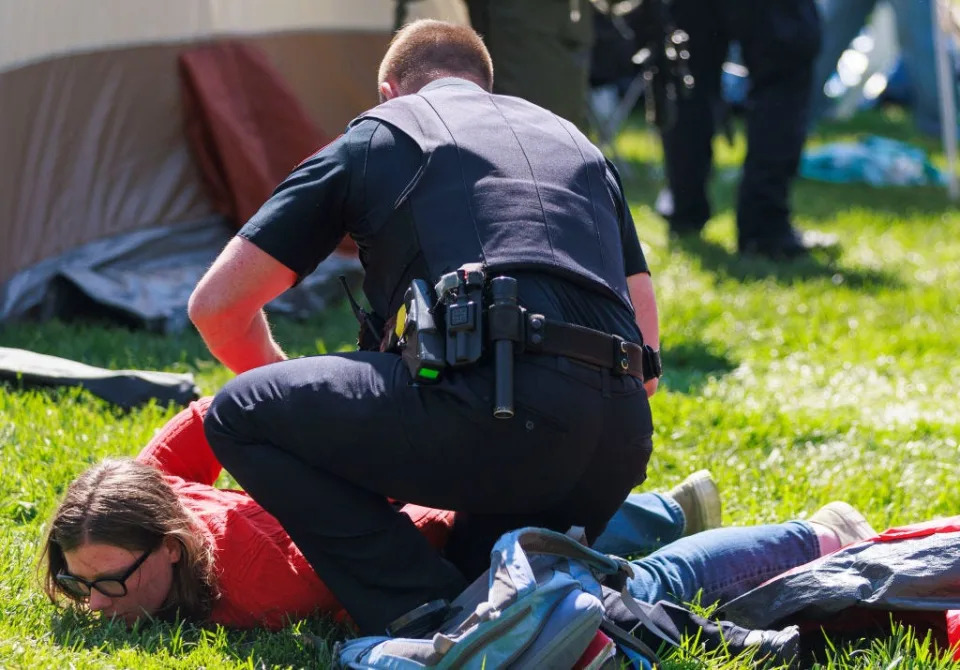
All the arrested protesters, including professors, have been banned from Indiana University's campus for a year.Jeremy Hogan/SOPA Images/LightRocket via Getty Images
While on campus, however, Greene said he and other students witnessed faculty shielding students from police and offering help to students who lost housing due to school suspensions.
Dennis said that in her holding cell during her arrest, she sang "old hippie songs and freedom ballads" as she comforted young students.
"I knew things were going to be OK, Dennis said. "I was the oldest person arrested that day."
Greene said many faculty members feel similarly to students and have some institutional power to help advance the cause.
"Faculty are typically more permanent fixtures of the institution. If they are upset, well, that causes long-term problems that can't be swept under the rug for a year or two," Greene said.
'How can we ignore what's going on and consider ourselves educators?'
Greene and Dennis are both supporting the student encampment following their arrests. Dennis still returns to the encampment — she received a stay on her ban as part of her appeal — and encourages other educators to participate in the student-led movement.
"I'm unsupportive of war as an answer to any sort of human or ecological problem, I think we need to push our moral and intellectual capabilities to really solve our problems in peaceful ways," Dennis told BI.
The current student protests have the fixtures of something from the Vietnam War era: student conversations on blankets, an outdoor library, and teach-ins by university faculty. At the IU encampment, Dennis is participating in a teach-in herself.
"UNICEF has said that Palestine is the worst place in the world to be a child," Dennis said. "I mean, how can we ignore that and consider ourselves educators? That just doesn't seem fathomable to me."
Virginia Commonwealth University students walk out of graduation
Sat, May 11, 2024
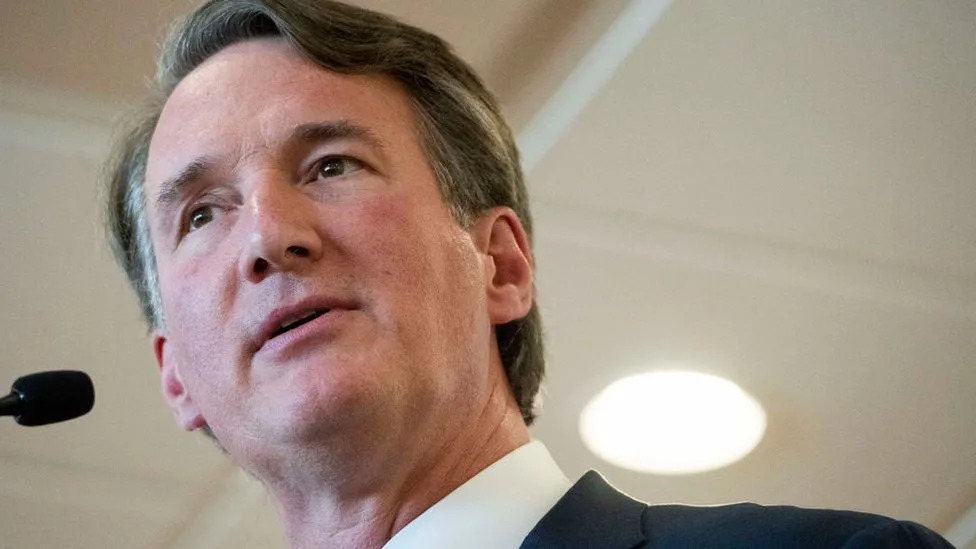
Dozens of Virginia Commonwealth University students walked out of their graduation ceremony on Saturday, partly over a speaker's response - the state governor - to campus protests.
It comes as US school officials brace for possible disruptions of commencement events over Israel-Gaza war protests.
Dozens of colleges roiled by protests are holding graduations this weekend.
More than 2,000 people have been arrested since protest began mid-April.
Social media posts on Saturday showed Virginia Commonwealth University (VCU) students in caps and gowns leaving the room as Republican Governor Glenn Youngkin began his commencement address.
Some students had criticised the selection of Mr Youngkin as that year's speaker, both for his opposition to a racial literacy requirement being considered by VCU as well as for saying that encampments on college campuses should not be allowed.
Video posted online show some of the VCU protesters chanting "disclose, divest - we will not stop we will not rest".
Many students protesters in the US are demanding that their schools, many with massive endowments, financially cut ties from Israel.
People were clapping so loudly, members of the audience couldn't hear Mr Youngkin speak, Sereen Haddad, a second-year VCU student who helped organise the protest, told the BBC on Saturday evening.
Ms Haddad said some 150 people marched outside the ceremony, including students who walked out.
Thirteen people, including six students, were arrested at VCU when the encampment there was cleared by police on 29 April.
Mr Youngkin's speech went on as planned despite the walk-out. He later posted a message on social media congratulating graduates and did not comment on the protest.
What do student protesters at US universities want?
'Student arrests will be my final college memory'
At another commencement on Saturday, the University of California Berkeley Chancellor Carol Christ opened the ceremony by acknowledging the weeks of demonstrations from protesters.
"I'm saddened by how this conflict has divided students, faculty and staff," she said, according to the LA Times.
The remarks drew some applause as well as chants of: "Hey hey, ho ho, the occupation has got to go".
Some 20 students stood up and began waving signs, Palestinian flags and chanting, "Free Palestine" as during another speech, the San Francisco Chronicle reported, and they were later joined in chants by more graduates.
In a statement, UC Berkeley said that the event continued despite being "unfortunately disrupted" and that protesters who left the ceremony did so voluntarily. No one was arrested.
The protest came a day after eight students wore shirts spelling out "UC divest" during the law school graduation ceremony.
In the past month, the BBC has counted more than 130 US colleges and universities with protests against the ongoing war in Gaza.
Campus protests have led to some graduation ceremonies being cancelled, including at New York's Columbia University, which said last week it was ditching its 15 May commencement in favour of smaller celebrations to focus on keeping students "safe".
Many schools have brought in additional measures for the graduation events, such as requiring identification, instituting clear bag policies, and issuing warnings that people causing a disruption will be removed.
Some commencement speakers have also withdrawn, like author Colson Whitehead, who said he would no longer be the keynote speaker at the University of Massachusetts Amherst event after police cleared an encampment there.
Others have had their speeches cancelled.
The University of Vermont and Xavier University of Louisiana recently rescinded invitations to have the US ambassador to the UN, Linda Thomas-Greenfield, speak under students pressure to drop the Biden administration official from the line-up.
Some universities, including University of Pennsylvania and Massachusetts Institute of Technology, had police clear encampments and arrest protesters on Friday ahead of graduation ceremonies.
At the University of Arizona, police used "loud munitions" and "chemical munitions" to clear remaining protesters from an encampment, the university said.
While some universities have avoided clearing the protest camps, others have brought in police to help remove demonstrators.
Earlier this week, the chief of police at Arizona State University was placed on paid administrative leave "pending a review" after the school received a number of complaints about his handling of the campus protests in late April, ASU said on Friday.

No comments:
Post a Comment